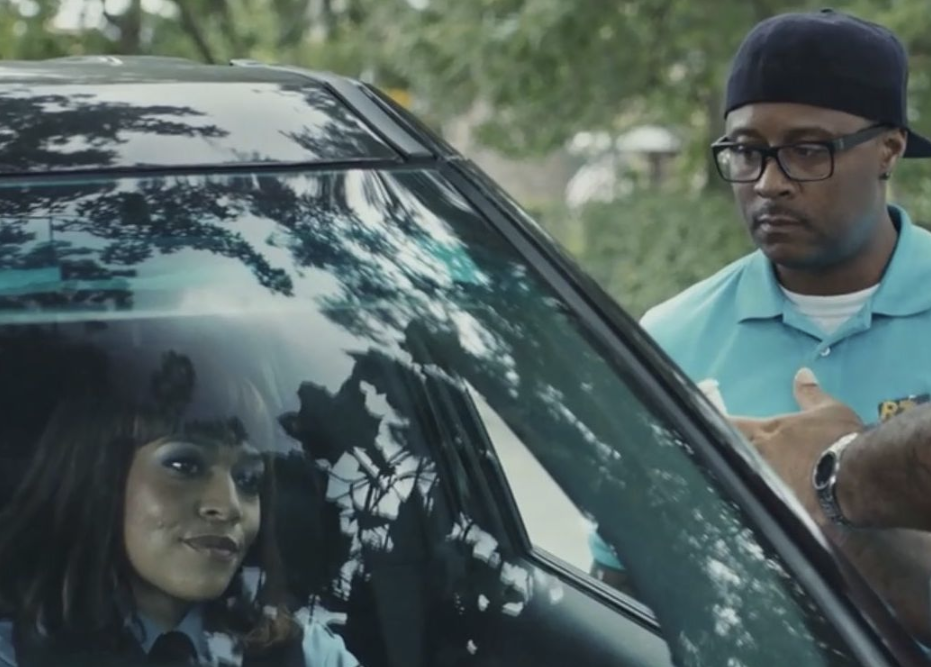Even though the new Comedy Central series South Side filmed all across the city last summer, production took place mostly in the neighborhoods encompassed by the show’s title. So don’t question the south-of-Madison credentials of the half-hour, single-camera comedy, which follows best friends Simon and Kareem, newly graduated from community college and ready to pursue the hustle, but still stuck for now in jobs at a neighborhood furniture and appliance rental store. Other regular characters include Quincy, the store’s manager and Kareem’s brother, and a pair of local police officers, Sergeant Turner and Officer Goodnight.
Bashir Salahuddin and Diallo Riddle, both former writers for Late Night with Jimmy Fallon, are the creators and executive producers. (Both also appear on the show: Salahuddin as Goodnight and Riddle in a recurring role as an ineffectual public defender.) Last week I sat down with two other series regulars and writers — Sultan Salahuddin (Bashir’s brother), who plays Simon, and Chandra Russell, who portrays Sergeant Turner — to talk about the show, what they heard from locals during shooting, and why it’s so important to show a goofier perspective on the South Side.
You’re both Chicago natives. Were there specific experiences from your own lives that you were able to bring to the show?
Chandra Russell: Well, the episode that I wrote [episode six, “Mongolian Curly”] is all about hair, and it's based on my experiences with black hair. You know, hair is a tricky thing for black women; it's a whole thing. That episode was really personal to me, with my own struggles about hair and what it says about me — wanting to have somebody else's hair, and trying to figure out how to love the hair that grows out of my head.
Sultan Salahuddin: When we got started in the writers’ room, one of the first things Bashir and Diallo did was make sure all of our stories were grounded in truth. So what we did is we had an exercise: We’d sit around just talking about some things that happened to us in our lives that were funny. The episode that I wrote [episode seven, “Chi-town”], with the spades and the stepping, all that is from my experience growing up.
There are some moments of Chicago specificity that stuck out to me. Chandra, in episode two your character makes a throwaway reference to [ABC news anchor] Cheryl Burton that made me laugh out loud, but I thought, nobody outside of Chicago is even going to catch that.
CR: But everybody in Chicago who’s seen it has said something specifically about Cheryl Burton!
SS: I think that really speaks to how we wanted to make a show that was sensitive to Chicago, for Chicagoans, and it was really important that we had Chicagoans both behind and in front of the camera. So that's when you kind of get those inside jokes. We have the comedy for everybody else, but then we have the little special nuggets for people who are from Chicago. Pretty much our whole writers’ room was from Chicago.
Most of the show seems to be shot on location. What neighborhoods were you shooting in?
SS: Let's see, you’ve got 73rd and Cottage Grove, 87th and Ashland, 87th and Vincennes, I think 103rd and Ashland, South Shore Country Club, Hyde Park … all over the place. It grounds us and keeps it authentic.
What reactions did you get from folks on the ground?
SS: There were people who were stopping their cars, like, “Y'all filming? Cool. Good luck.” There were people who were trying to direct, telling us that they need to be playing certain parts. A lot of the youth would come out and say, “Hey, what are you guys doing? What are these trucks doing?” And they had a lot of questions. There were people making a show in their neighborhood, on their side of town. When's the last time you seen that? So from giving that energy and receiving it back, it only just made us work harder and stronger in our performances.
CR: Yeah, I think it’s Kendrick Lamar who talks about watching Tupac shooting a music video in Compton when he was growing up, and how that inspired him and showed him how the world could be. And there would be those kids just watching us from the windows.
What are you hoping people take away from the show?
SS: For our viewers to see their city in a funny and positive way. My brother always talks about how what you see on TV, or the usual headlines — you're just getting a small piece of a very large pie. Our job is to make sure that you see the rest of that pie: love, life, happiness, Harold’s chicken and mild sauce, all kinds of stuff like that.
CR: When we were filming, there was so many times that people would come up to us, and because I play a cop and they would see the uniform, they would think it was Chicago P.D. And we’d tell them, “No, we're actually shooting a comedy for Comedy Central.” And they’d be like, “What? This is a comedy?” And they would get so excited. It’s like, finally, we can shake up this narrative a bit. It’s not that we’re saying the challenges Chicago faces aren’t real. We’re just saying there are a lot of other parts about it; we are not only those challenges. Mostly it just felt like an overwhelming joy — like, “Finally.”
South Side premieres Wednesday, July 24th, at 9:30 p.m. on Comedy Central



